
by Jennifer Iacovelli | Nov 4, 2014 | 2014, Africa, Awareness, Blogging, Girls, Human Rights, Humanitarian, Inspirational, International, Maternal Health, Millennium Development Goals, ONE, Social Good, Vaccines, Womanhood, World Bank, World Moms Blog
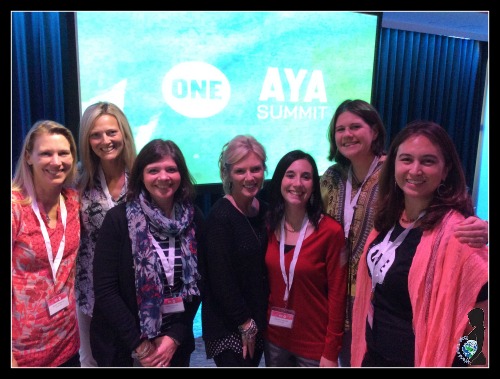
It has been almost two weeks since I attended the AYA Summit in Washington DC at Google’s offices with ONE, and I still feel a flood of emotion each time I think about the experience. As I wrote on my blog last week, the words to explain such a powerful and inspiring event are hard to come by.
The AYA Summit focused on issues facing girls and women in the developing world, with a special emphasis on Sub-Saharan Africa. The name AYA comes from an African Adinkra Symbol, which means fern and symbolizes endurance, resourcefulness and growth.
I, along with fellow World Moms Blog contributors Jennifer Burden, Elizabeth Atalay, Nicole Morgan, Nicole Melancon, Kelly Pugliano and Cindy Levin, sat in a room of about 80 bloggers and listened to inspiring panel after inspiring panel. In addition to thought-provoking conversations about human trafficking, the importance of vaccinations, electrifying Africa, making change through economic opportunities and the dire need to end Ebola in West Africa, we witnessed incredible performances by a young poet named Marquesha Babers and actress Danai Gurira.
Tears were shed. We were all moved and left wanting to do more for women and girls around the globe.
Why invite only bloggers to such a powerful event? According to this article from WUSA9 who covered the event, the combined audiences of our blogs exceeds 45 million and 28 states. As it was noted, “that kind of reach is priceless.”
There was a general theme of storytelling throughout the event. As bloggers, we have the ability to tell the stories of girls and women around the globe that the mainstream media simply cannot duplicate. We use our experiences as women, mothers and global citizens to lend our voices to those who don’t have a microphone and help others join in the conversation. We personalize the stories, talk about our concerns, and amplify the issues that media may not even be fully aware of or willing to devote the time to cover.
As Ginny Wolfe, Senior Director, Strategic Relationships at ONE, said at the very start of the AYA Summit, “We’re not asking for your money, we’re asking for your voice.” If you are reading this post, you can lend your voice too.
Though it is still hard to put into words what the AYA Summit meant to me, I thought I would share the highlights and key takeaways through a series of tweets during the event:
Read what other World Moms are writing about the event:
For more on the AYA Summit and the work that is coming from the event, visit and follow the AYA Summit 2014 Flipboard.
This is an original post written for World Moms Blog by Jennifer Iacovelli who also writes at www.anotherjennifer.com.
How will you or do you use your voice to stand up for those who are unable to speak up for themselves?
Jennifer Iacovelli is a writer, speaker and nonprofit professional. Based in Brunswick, Maine, she’s a proud single mom of two boys and one Siberian husky. Jennifer is the author of the Another Jennifer blog and creator of the Simple Giving Lab. Jennifer is also a contributing author of the book The Mother Of All Meltdowns. Her work has been featured on GOOD, BlogHer, USAID Impact, Feed the Future and the PSI Impact blog. Her latest book, Simple Giving: Easy Ways to Give Every Day, is available everywhere. Her passions are writing, philanthropy, her awesome kids and bacon, though not necessarily in that order.
More Posts

by World Moms Blog | Oct 22, 2014 | 2014, Africa, Awareness, Being Thankful, Caring, Casting a Wider Net, Communication, Economy, Education, Girls, Government, Guest Post, Helping, Human Rights, Humanitarian, Humanity, Inspirational, International, Life, Loss of Child, Media, Motherhood, Nigeria, Older Children, Poverty, Prejudice, Relationships, Safety, School, Social Equality, Terrorism, Tragedy, Women's Rights, Working Mother, World Mom Feature, World Motherhood, World Voice
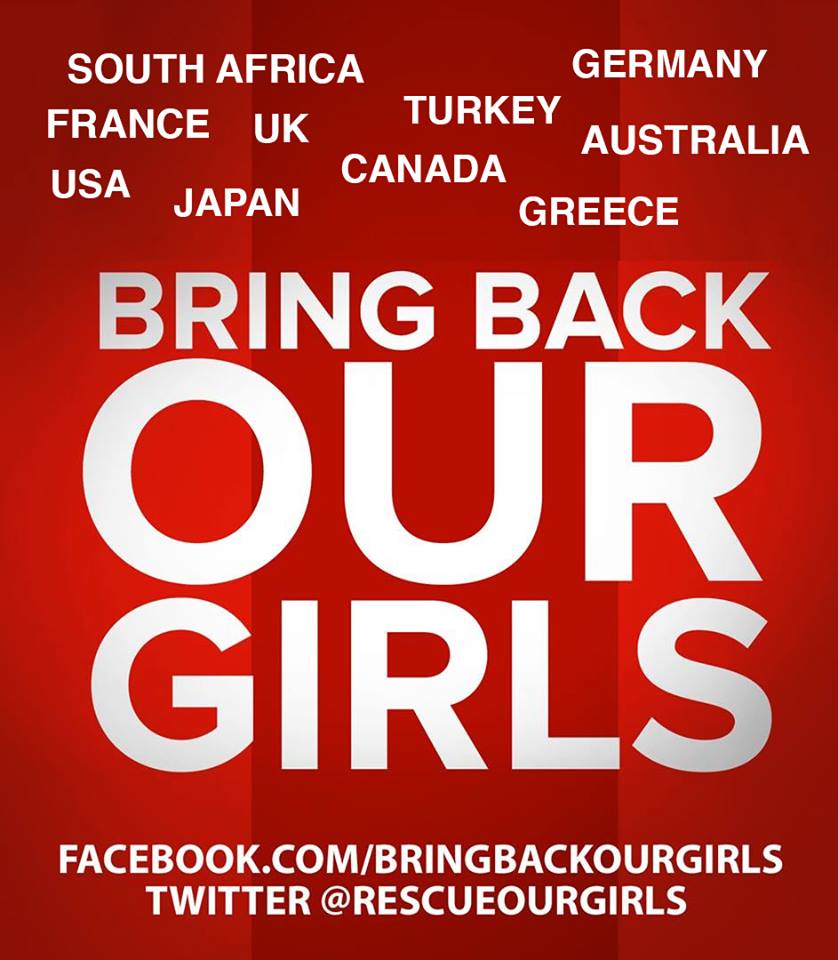 “My daughter said she was going to go to school so that she can wipe away my tears. How is she wiping my tears away in the den of the terrorists?”
“My daughter said she was going to go to school so that she can wipe away my tears. How is she wiping my tears away in the den of the terrorists?”
-mother of one of the #ChibokGirls, abducted on April 14th, 2014, speaking on Day 188 of their abduction -October 19th, 2014
As I looked at her I realized that all this woman’s hopes and aspirations rest on her daughter. For most of the poor people in this part of the world, children are like a source of pension; they are the ones that will help you in the future. They are the ones that will take care of you in your old age, when you are unable to look after yourself. They represent life. As I looked at her I also realized that her daughter means more to her than I can ever imagine. Her daughter is her everything. A source of hope.
These parents are ready to give their lives for their children to have an education. That was what the #ChibokParents did. Amidst the insecurity in Nigeria, they still wanted their children to be educated to better their positions in life. They knew the only way to break the shackles of poverty was through education. For daring to send their children to school to have a better life, instead they have been punished.
These children grow up to not only take care of their parents but siblings as well so that a generation of people who have survived the shackles of poverty would emerge.
For some, poverty is going to school in the morning without breakfast and returning home not expecting lunch but still striving everyday to be in school so that one day you will look back and say I SURVIVED (I AM A SURVIVOR).
I remember one of the fathers at one of our Sit Ins for the #BringbackOurGirls campaign—which started on April 30th with a protest demanding for the rescue of #ChibokGirls—saying he does not have a Television. All he has is a Radio from which he gets to hear of our activities. I wept! In this day of iPads, Tablets, iPhones and what have you, someone does not have a simple television that most of us take for granted.
So now you can begin to understand that to the #ChibokParents these girls are much more than daughters, they are future benefactors
A lot of parents, especially mothers, are forced to live a life of servitude and poverty in order for their children to be educated. The education that is taken for granted in most developed countries is not so in Nigeria and many other African countries.
I remember growing up and how my parents had to struggle to make sure we were educated. We often had to go without food when the situation grew dire but never were my school fees unpaid. I remember my father trekking long distance to buy a textbook I needed badly because the money was not enough for him to pay for a bus. All the suffering was for the children to be able to break the vicious cycle of poverty and one day to be able to take care of ourselves and also take care of our parents and siblings.
A lot of parents invest all they have in their children. For those who are poor, they do not have cars, houses or any investments. All they have are their children. Can you imagine these children being abducted, as is the case with the #ChibokGirls, abducted from school, where they wanted to get an education and make life better for themselves and their families? When these children of the poor are abducted and taken away, the future of a whole generation also is taken away.
As I looked at the woman with tears streaming down her face, all I could see was my own mum, who had to be the head-of-household, who worked all day and night to ensure I had an education. I look back to the days when there was no food to be eaten and yet we found our way to school. I thought of what a burden it must have been for my parents to get us educated, to sacrifice all that they had.
While some of my parent’s contemporaries were busy enjoying life in the way they could with what they had, my parents tightened their belt to make sure that we, their children, had an education and of course today we are their pension. If any of us had been abducted while seeking an education, where would we be today?
As I stood watching the Chibok mother, all I could think about was my mother struggling to give her children the life she did not have and how hard she worked to provide that for us. I thought of my mother, now living in the lap of luxury because she worked so hard four sake. As I stood looking at the Chibok Mother, I realized she too must be allowed to break the shackles of poverty. She too must live in comfort, as her daughter promised her. Her tears must be wiped away. As I stood looking at her I realized that I cannot stop demanding for the rescue of the #ChibokGirls, for that Chibok mother who has given her all, hoping that one day her tears would be wiped away.
I realized that I must demand the rescue of the Chibok girls.We all must.
Demanding the safe return of the Chibok girls to me is like making a demand for the ME that was 23 years ago. As I stood I realized that no matter how hard it gets, no matter how much we are intimidated and harassed, no matter the threat of arrest from our government, I cannot afford to give up on the #ChibokGirls.
To give up on the #ChibokGirls is to give up on myself (the WHO that I have become) and to give up on the mother with tears streaming down her face, waiting for her daughter, who promised to wipe away her tears.
This is an original, Guest Post for World Moms Blog from our sister in Nigeria and mother of two, Aisha Yesufu.
Aisha Yesufu was born in Kano, Nigeria. When she turned 40, in December 2013, she decided it was time to devote her life fully to the services of others. As she describes it,
‘The first 40 years of my life I devoted to myself, so I could be financially independent and help others. But they say: you can’t help the poor by being poor yourself, so the next 40 years, God willing, I am going to devote to others; for me, a full life will be based on what positive differences I have made in the life of another.”
And in came the unfortunate tragedy of the abduction of the #ChibokGirls. Following their abduction, on April 14th 2014, Aisha joined a group of like minded people to demand the rescue of the 219 school girls, who still today remain in the hands of the terrorists. These girls, between the ages of 16 to 18, were abducted from their school, in their quest for knowledge. The group known as the #Bring Back Our Girls campaign has been able to push the issue of their rescue in public discussion both locally and internationally.
Aisha is the coordinator of the daily Sit In for the #BringBackOurGirls campaign group. The group has, without fail, come out daily since the 30th of April, 2014, despite all forms of intimidations and harassment by sponsored persons.
To get involved in the conversation and learn more about the plight of the 219 Nigerian School Girls, visit: #BringBackOurGilrs
World Moms Blog is an award winning website which writes from over 30 countries on the topics of motherhood, culture, human rights and social good. Over 70 international contributors share their stories from around the globe, bonded by the common thread of motherhood and wanting a better world for their children.
World Moms Blog was listed by Forbes Woman as one of the "Best 100 Websites for Women 2012 & 2013" and also called a "must read" by the NY Times Motherlode in 2013. Our Senior Editor in India, Purnima Ramakrishnan, was awarded the BlogHer International Activist Award in 2013.
More Posts

by ThinkSayBe | Oct 3, 2014 | 2013, 2014, Awareness, Babies, Childhood, Communication, Computers, Discipline, Education, Entertainment, Environment, Family, Girls, Kids, Life, Life Balance, Motherhood, Nature, Parenting, Technology, ThinkSayBe, Uncategorized, USA, World Moms Blog, World Motherhood, Younger Children
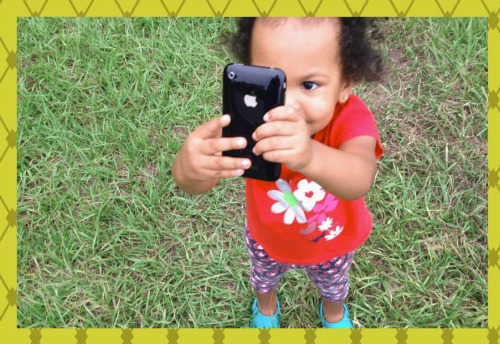 “Yes please, yes please, yes pleeeeease!” is what I hear almost every time my toddler sees or hears my phone. If she does not get it, she isn’t too happy. She may move on to playing with something else, but sometimes comes back pointing at where she last saw my phone, and says “yes please!” again. (more…)
“Yes please, yes please, yes pleeeeease!” is what I hear almost every time my toddler sees or hears my phone. If she does not get it, she isn’t too happy. She may move on to playing with something else, but sometimes comes back pointing at where she last saw my phone, and says “yes please!” again. (more…)
I am a mom amongst some other titles life has fortunately given me. I love photography & the reward of someone being really happy about a photo I took of her/him. I work, I study, I try to pay attention to life. I like writing. I don't understand many things...especially why humans treat each other & other living & inanimate things so vilely sometimes. I like to be an idealist, but when most fails, I do my best to not be a pessimist: Life itself is entirely too beautiful, amazing & inspiring to forget that it is!
More Posts
Follow Me:


by Salma (Canada) | Sep 12, 2014 | 2014, Awareness, Girls, Human Rights, Humanity, International, Salma, Women's Rights, World Motherhood

“…we are living in a material world, and I am a material girl…”
Madonna’s tune rings true today more than ever. Parents in the ’80s may have pulled their hair out trying to teach their kids about the perils of materialism, but they had no idea what was to come. They could not have known that the whole world would be turned upside down all for the price of cheap clothes and goods. (more…)

An Imperfect Stepford Wife is what Salma describes herself as because she simply cannot get it right. She loves decorating, travelling, parenting,learning, writing, reading and cooking, She also delights in all things mischievous, simply because it drives her hubby crazy.
Salma has 2 daughters and a baby boy. The death of her first son in 2009 was very difficult, however, after the birth of her Rainbow baby in 2010 (one day after her birthday) she has made a commitment to laugh more and channel the innocence of youth through her children. She has blogged about her loss, her pregnancy with Rainbow, and Islamic life.
After relocating to Alberta with her husband in 2011 she has found new challenges and rewards- like buying their first house, and finding a rewarding career.
Her roots are tied to Jamaica, while her hubby is from Yemen. Their routes, however, have led them to Egypt and Canada, which is most interesting because their lives are filled with cultural and language barriers. Even though she earned a degree in Criminology, Salma's true passion is Social Work. She truly appreciates the beauty of the human race. She writes critical essays on topics such as feminism and the law, cultural relativity and the role of women in Islam and "the veil".
Salma works full-time, however, she believes that unless the imagination of a child is nourished, it will go to waste. She follows the philosophy of un-schooling and always finds time to teach and explore with her children. From this stance, she pushes her children to be passionate about every aspect of life, and to strive to be life-long learners and teachers. You can read about her at Chasing Rainbow.
More Posts - Website

by Alison Fraser | Sep 9, 2014 | 2014, Africa, Canada, Education, Eye on Culture, Girls, Human Rights, Humanitarian, Humanity, Life Lesson, ONE, Poverty, Social Good, Tanzania, Uncategorized
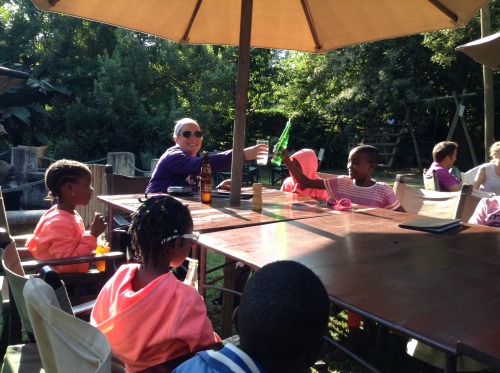
Two months ago, I travelled back to Arusha, Tanzania as part of my work with Mom2Mom Africa. Each time I am in Arusha, I make sure to stop by a local outdoor restaurant frequented by many tourists. The restaurant resides on a beautiful piece of property, and offers free Wifi to connect back home to loved ones. I consider this to be a real luxury in the areas I work in Arusha so take full advantage of this establishment whenever possible.
On my last trip, I decided that I would take several of our Mom2Mom Africa students to this restaurant as a “treat”. What was originally planned as a small group outing with 5 or 6 children, ended up turning into a van full of children, and my colleague Aloyce. It was absolutely priceless to see me walk through the grounds followed by 12 little Tanzanian children, and Aloyce at the rear to ensure we didn’t lose any along the way! The other restaurant patrons could not stop staring!
I had questioned this dinner outing for days before making a decision to go ahead with it. Many believe that exposing those in poverty-stricken areas of the world, to ‘luxuries’ is unjust; a tease. I didn’t want to be that white foreigner.
But, after much thought, I decided to go ahead with our big dinner date. What influenced my final decision was the fact that the same holds true for my three little girls in Canada. As a mother, I often treat my girls to little extravagances. These are not every day occurrences, and in fact are more rare than common. And my girls understand that. If they could be treated each and every day, there would be no argument on their part. But, they know that even though that might be the reality of other little girls their age, it is not their reality. And they are ok with that and simply choose to enjoy the times that they do get to experience trips or dinner at fancy restaurants. I used this experience with my girls as the deciding factor in Tanzania. After all, everyone likes to be treated!
Seeing the kids eat pizza until their bellies were full, drinking pop, and laughing with their friends was one of the highlights of my time in Tanzania. When they noticed the playground with swings and teeter-totters, I lost them in play for 2 hours! They were beyond happy. And, that made me beyond happy. And, at that point, I thought to myself that I had made the right decision. I left the restaurant on cloud nine, with twelve happy little ones singing all the way home in the van.
All had gone as planned, until one little girl said out loud in the van…”I now know how mzungus (white people) live”…and my heart broke.
The restaurant is staffed with locals but caters to tourists, most of whom are white. Instead of this being a fun night out for all, Canadians and Tanzanians alike, the take home message was that white people deserve and live in a world of luxuries. My plan back-fired on me with a vengeance. It has been two months since that night, and that little voice from the back of the van still haunts me. I guess my mommy instinct was off this time. We all worry about making decisions that may negatively affect our own children’s lives. I now worry constantly about my decisions and how they may impact the lives of so many who call me “Mama Alison” in Tanzania.
Do you think it’s better to know what you are missing or not?
This is an original post written for World Moms Blog by Alison Fraser. Photo by Alison Fraser.
Alison Fraser is the mother of three young girls ranging in age from 5 to 9 years old. She lives with her family in Cambridge, Ontario, Canada. Alison works as an Environmental Toxicologist with a human environment consulting company and is an active member of the Society of Environmental Toxicology and Chemistry (SETAC). She is also the founder and director of the Canadian Not for Profit Organization, Mom2Mom Africa, which serves to fund the school fees of children and young women in rural Tanzania. Recently recognized and awarded a "Women of Waterloo Region" award, Alison is very involved in charitable events within her community including Christmas Toy and School Backpack Drives for the local foodbank.
More Posts - Website
Follow Me:



by ThinkSayBe | Jun 12, 2014 | 2014, Africa, Awareness, Being Thankful, Communication, Discipline, Education, Expat Life, Eye on Culture, Family, Girls, Humor, Older Children, Parenting, Technology, Teenagers, ThinkSayBe, USA, World Motherhood
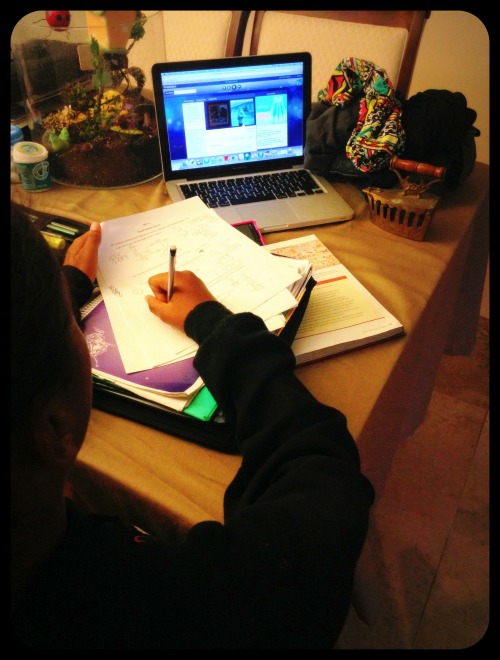
“But mom, why can’t I do my homework in front of the TV??? I’m not watching it, I’m just listening to it!!”, says my 12-year-old girl, emphasizing the word ‘watching’ with a half roll of the eyes.
My daughter is a really cool human & a great child. She is a tween so craziness and challenges come with the territory. Still, she has sweet moments, and she “OKs” everything, whether she remembers later or not.
But, my life was very different growing up in Italy and then Tanzania…
By age 9 my older brother & I alternated daily chores. We had to do dishes & sweep daily. There was no dillydallying, no talk-back, no having to dry our hands to like a song on Pandora…. none of that. We did homework on the kitchen table, our beds, in the yard, and wherever else. After I was done with homework I’d have to use the house phone, speak to a parent with good phone manners, & find out if my friends could come play. There was no texting them.
Everyone knew our plans; at least initially (smile). Outside we used our imagination to play with nothing. We picnicked under a tree in this huge sunflower field. We rode our bikes in circles in the bus’ parking lot and made sure we were home when the lights came on.
When I was 11 we moved back to Tanzania. Life here was drastically different, yet, in some respects there was more access to things than we had in the small Italian town we lived in. However, constant electricity and running water were gone. We had a western toilet in our home, but often had to use toilets requiring squatting, be they a hole over a sceptic tank, or an Eastern latrine. Not having water & electricity all the time required planning.
Though there was hired help, we also had to fetch water. If you don’t like fetching water you learn to use it sparingly. You take a shower from a bucket that’s a quarter full and come out clean! You recycle water so that first you wash your hair by dipping it into the bucket, then use the same water as the first cycle of your laundry, which you wash by hand. Having city-wide rationed electricity, meant ensuring you have kerosene, wick for lamps, and match sticks. You actually needed plenty of match sticks in Tanzania, because there is this one brand that makes them and you’re lucky if one out of five matches actually lights up & stays lit. HAHA!
We must see these things as humorous. Lack of electricity and paying for it in advance, meant using it responsibly. The radio would be on, and so would the TV for some parts of the day. We knew to close the fridge fast and to unplug the iron as soon as the job was done. Ironing was not always done with an electrical iron, either. Some times we would use a charcoal iron. It sounds like it’s from an entire different era, right? It’s still being used. A charcoal cast iron had to be used carefully. You’d also plan how to get hot coals so instead of wasting charcoal, kerosene fuel, and good match sticks, you’d use the charcoal for cooking. That required planning as well. A lot of planning and patience for a youngster, and children had to consider all these things from toddlerhood!
I am so infinitely grateful we lived this kind of life in my teenage years. Though I am sure I threw crazy hormonal arrows (figuratively speaking) at my mom, I think that having to deal with these realities made me get myself together quickly, thus sparing her six years of teenage craze. As far as school goes…wow! We had mandatory knee-high socks & buffed black shoes, mandatory hair pleats that I never had, monitors & prefects who thrived on their power to make us kneel for ‘misbehavior’, and hit-happy, switch-carrying teachers in the hallways who would whack you for no good reason.
In elementary school we had to chant….slowly & loudly…..”GOOD MORNING TEACHER!” Then we’d answer & ask, “FINE THANK YOU TEACHER, AND HOW ARE YOU, TEACHER?”, then we’d be permitted to sit down. In boarding school we had exactly 30 minutes to eat. The first year we ate food we individually cooked the night before, hoping it was still good without refrigeration. As a senior, food was made for us, so we’d hope it was ready & that we didn’t have to scoop bugs out of our beans. We’d always wash our dishes before returning to class. All of this, in 30 minutes.
At this school there was no corporal punishment. However, if we were late or didn’t follow other rules, we’d have some agricultural work for at least one period.
We studied in the hall after we cleaned our dinner mess. After two hours of supervised solid studying, we’d return to our hostel rooms (mine had four bunk beds with three beds each), and lights were out by 10pm. Everyone took showers in the morning, which I found to be unnecessary as the water was very cold, so I would leave some water in the courtyard for the sun to heat , and take a shower after school.
When I came to the United States I didn’t think I had a different work ethic than anyone else. I thought we all work hard & have different struggles. As the years passed I began to see certain differences & felt extremely fortunate for my history as it was.
As a girl I was lucky that my mother (who is partially Afghani & Punjabi) didn’t believe that I was worthless, blessed that she believed in education and sent me to school. I was also fortunate that I wasn’t betrothed at a young age, or at all. As I was in college I understood that I was privileged and had to make other women proud.
I would have to get the best grades, be a well-rounded student & not take electricity and running water for granted. So when my daughter asks why she can’t do her homework in front of TV, I don’t know what to say! OK, I do answer her, trying to use logic she’ll understand. She visited Tanzania for a few months in 2010, but she cannot relate to my history.
When my daughter was round age four she always asked if she could help with chores, but as I tried to rush I’d ask her to draw or play instead. I thought the environment around us would do for her what it did for me at her age. I knew I wasn’t in Italy, or in Tanzania, but I still thought I wouldn’t be the only one pushing for a balanced human. I also didn’t anticipate technology advancing so incredibly fast & how much gadgetry she would have at her disposal. In retrospect I should have encouraged her willingness to help.
She is now 12, doesn’t like to do any chores other than the occasional Swiffer mopping. She wants to do homework while listening to TV, somehow ignoring the visuals, and she wants to spend her other homework time listening to pop songs. She does practice Brazilian Jiu Jitsu and has a unique passion for it. But when not doing her school work, she looks at photos with funny quotes, watches short videos, and messages her friends on her phone. Our lives are so different. How do I teach her what I’ve been taught?
Is it drive? Is it thirst? Can you relate? How do you teach your children how to work hard? Please share your findings with me!
This is an original post to World Moms Blog by Sophia in Florida, USA. You can find her blogging at Think Say Be and on twitter @ThinkSayBeSNJ.
Photo credit to Trocaire. This photo has a creative commons attribution license.
I am a mom amongst some other titles life has fortunately given me. I love photography & the reward of someone being really happy about a photo I took of her/him. I work, I study, I try to pay attention to life. I like writing. I don't understand many things...especially why humans treat each other & other living & inanimate things so vilely sometimes. I like to be an idealist, but when most fails, I do my best to not be a pessimist: Life itself is entirely too beautiful, amazing & inspiring to forget that it is!
More Posts
Follow Me:







 “Yes please, yes please, yes pleeeeease!” is what I hear almost every time my toddler sees or hears my phone. If she does not get it, she isn’t too happy. She may move on to playing with something else, but sometimes comes back pointing at where she last saw my phone, and says “yes please!” again.
“Yes please, yes please, yes pleeeeease!” is what I hear almost every time my toddler sees or hears my phone. If she does not get it, she isn’t too happy. She may move on to playing with something else, but sometimes comes back pointing at where she last saw my phone, and says “yes please!” again. 










